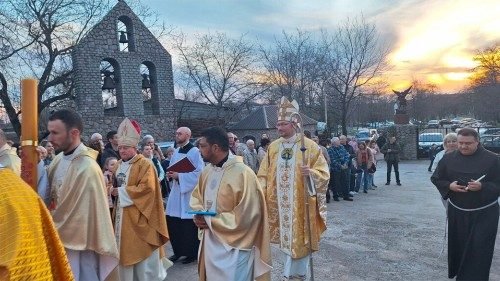On the third anniversary of the full-scale war in Ukraine, the Apostolic Nuncio to Ukraine, Archbishop Visvaldas Kulbokas, laments that many have become de-sensitized to the ongoing tragedy and says that only Christ can bring hope against all hope.
By Deborah Castellano Lubov
“Only the Lord God Almighty can bring hope against all hope…”
The Apostolic Nuncio to Ukraine, Archbishop Visvaldas Kulbokas, made this observation to Vatican Media on 24 February 2025, the third anniversary of the War in Ukraine, since the full-scale Russian invasion in 2022.
The Nuncio began his remarks by stressing how, especially this Jubilee Year, prayer is a “precious gift” which Ukrainians treasure and pursue.
Entrusting to prayer
Reflecting on what “war really is,” he recalled when a civilian, a 60-year-old woman, in no way connected to military actions, was imprisoned in Russia for almost three years. He remembered her saying, ‘I could no longer understand what I had done and what I had not done, what was real and what was fantasy or illusion. I no longer remembered what I had stated, said, or signed.’
“This,” he lamented, “is the condition of thousands of people, and so far, I personally have not seen even one effective channel working to help them.”
Amid this harsh reality, Archbishop Kulbokas reassured once again, that he entrusts “the situation of these thousands and thousands of prisoners—who are without hope—to the prayers of everyone.”
“Because only the Lord God Almighty,” he continued, “can bring hope against all hope, as the Holy Father also emphasized in the bull of indiction for the Jubilee,” which underscores the importance of prayer, “as there truly are situations that, from a human perspective, have no way out.”
Key events
At the end of this third year of full-scale war, the Nuncio highlighted key events, beginning with the liberation of two Greek-Catholic priests, Father Ivan Levytskyi and Father Bohdan Heleta, on June 28 of last year.
To be able to embrace the two Redemptorist priests who had been in prison for over a year and a half amid great difficulty, he said, was a great joy. “Moreover, it was uplifting to witness their faith, which enabled them—despite the many hardships they suffered during their imprisonment—to continue offering their sacrifices in union with the sacrifices of Jesus.”
Another very significant and joyful moment, Archbishop Kulbokas recalled, was the visit of Vatican Secretary of State, Cardinal Pietro Parolin, to Ukraine last July. He said that prayer was at the heart of the visit. “Feeling the presence of the Holy See, the Secretary of State, and the Holy Father himself—through the Secretary of State—was deeply significant, even physically, here in Ukraine.”
Another particularly joyful moment, he recalled, happened just a few weeks ago, on February 1, when a group of about 200 young Ukrainian Catholics had an online meeting via video link with the Holy Father. “Since the Jubilee Year is dedicated to hope, for these young people,” the Nuncio stated, “it was also a powerful sign of hope. “
Ukraine in prayer for Pope Francis
The Apostolic Nuncio acknowledged the Holy Father’s health difficulties in these days, adding that as one would not expect, that, even with the war on the country, has been amid the top headline. “Over these days, I have received many messages of solidarity not only from Catholics or Bishops but also from leaders of other Churches and from the Office of the President of Ukraine, expressing sincere concern for the Holy Father’s health.
“This was surprising even to me,” he reflected, “because the war so evidently occupies everyone’s mind and space. Yet,” he noted, “it was moving to see how the Pope’s health also touches the hearts of state officials and pastors of various denominations.” This, he pointed out, highlights how the information landscape in Ukraine differs from that of other countries.
De-sensitized public
For many international media outlets, especially secular ones, the Archbishop observed, the war has become, at least in part, something routine.
“But when you are here,” he explained, “you understand that the number of casualties is not decreasing. The deaths on the front lines are rising—more in 2023 than in the first year of the war, and last year more than in 2023. The number of civilian deaths, as United Nations reports confirm, has also increased and continues to grow.”
Even where he is in Kyiv, he observed, international media cover only the most massive missile attacks, which happen maybe once a month. “But if someone were to ask me when the last night without a drone attack in Kyiv was, I wouldn’t remember. And if we talk about Kharkiv or Kherson, those cities also suffer artillery fire, making the bombings far more frequent and intense than in Kyiv.”
The final key moment he went on to acknowledge was the peace demonstration in Kyiv of the European Nonviolent Action Movement in July. The movement’s intention, he remembered, is mobilizing societies before wars break out.
He noted that they plan to repeat this project again this year, as he applauded their efforts to strengthen civil society’s mobilization “so that the issue of war and peace is not left solely in the hands of politicians,” “but calls on everyone to seriously consider what they can do in their own roles.”
A challenge to all humanity
This war, Archbishop Kulbokas said before concluding his remarks, challenges all of humanity.
On many fronts, he said, action is needed to push governments and international organizations to restore peace, and therefore, he invited, “We all must grow spiritually and bear witness to hope…”



